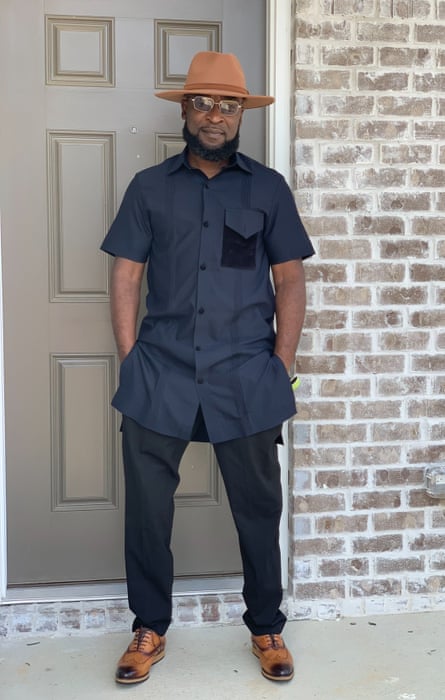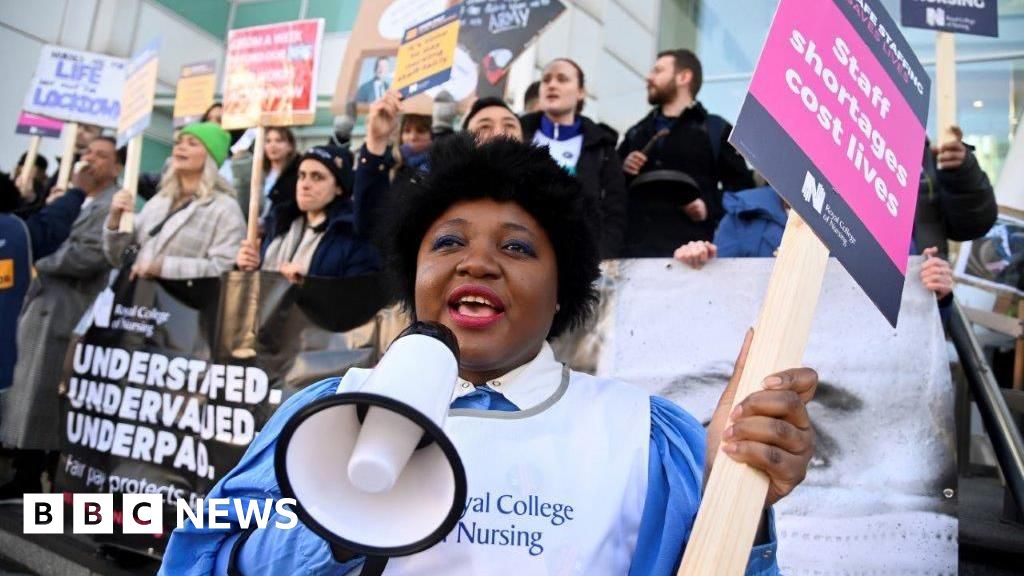A Liberian-born man detained by Ice in Georgia was put in solitary confinement after complaining about flooding in his cell that he said was potentially dangerous for his electronic prosthetic legs, the Guardian can reveal.
Rodney Taylor recently spent three days in what CoreCivic calls a “restrictive housing unit” at Georgia’s Stewart detention center, after refusing to enter his cell because a leak had left the floor with about an inch of water. That would be a potential disaster for Taylor, since his battery-powered, microprocessor-controlled prosthetic legs can’t get wet.
It was only the latest episode for Taylor, a double amputee, since Ice agents detained him at his Loganville, Georgia, home on 15 January. His problems illustrate how ill-prepared the Trump administration is to meet the needs of immigration detainees with disabilities as they carry out mass deportation plans.
“They don’t see you as an individual, but as someone being deported,” Taylor said. Taylor’s fiancee, Mildred Pierre, called the experience of monitoring his well being during the last six months like “receiving blow after blow”.
The Guardian first reported on Taylor’s case on 25 April. Since then, his challenges in detention have included the screws coming out of his prosthetic legs, causing him to fall and injure his hand, and being unable to obtain new, fitted prosthetic legs at a nearby clinic as a result of them being delivered without a charger for their battery. Then, once his fiancee brought a charger, a second appointment at the clinic two months later left him without results because the clinic was not familiar with Taylor’s model of prosthetics.
The immigration detention system “can’t care for anybody beyond basic medical needs”, said Amy Zeidan, a professor of emergency medicine at Atlanta’s Emory University who has researched healthcare in the immigration detention system. The result: “mismanagement bordering on medical neglect” in cases like Taylor’s, she said.

Meanwhile, Pierre has spent months “trying to figure out – who do I call? Who’s going to listen?”
She has contacted Georgia’s senators, Jon Ossoff and Raphael Warnock, as well as nonprofit organizations that advocate for people with disabilities and immigrants. “I am afraid for Rodney,” she wrote to Ossoff’s office on Saturday, after her fiancee had the run-in with guards.
Warnock did not respond to queries from the Guardian. Ossoff said he couldn’t comment on an individual’s casework.
On Sunday, the day after Taylor refused to enter his cell, guards handcuffed him, and placed him in solitary confinement – until Tuesday, when Stewart’s assistant warden released him. During this time, he received no water to drink, and could not charge the battery in his prosthetic legs, Pierre said.
Brian Todd, a spokesperson for CoreCivic, the company that owns Stewart, wrote in an email that Taylor “is being regularly monitored by facility medical staff, with all known medical issues are being addressed, and our staff continuing to accommodate his needs.” He also said that solitary confinement “does not exist” at Stewart, and that it uses “restrictive housing units”. Experts have said that conditions in CoreCivic’s RHUs are the same as solitary confinement.
Taylor was brought to the US from Liberia by his mother on a medical visa as a small child. He went through 16 operations. He has two fingers on his right hand. Now 46, he has lived in the US nearly his entire life, works as a barber, is active in promoting cancer awareness in his community, and got engaged only 10 days before Ice detained him in January.
Despite having a pending application for US residence – commonly known as a “green card” – Ice detained and locked up Taylor in January due to a burglary conviction he received as a teenager and for which the state of Georgia pardoned him in 2010, according to his attorney, who shared paperwork from his case with the Guardian.
When he was detained, Taylor was only days away from being fitted for new prosthetics. Requests to Stewart to make an appointment for him to follow through on this appeared to be falling on deaf ears for four months. Then, after the Guardian’s story in April, Taylor received a visit from the warden. An appointment was made for late May.
Pierre had gotten Taylor’s clinic in Lawrenceville, Georgia, to send the new prosthetics to a clinic in Albany, Georgia, about 75 miles from Stewart – in February. Nonetheless, when guards took him, shackled, to the rural clinic on 23 May, no one from Stewart or the clinic had ensured that the battery would be charged.
Not only that, when he returned in late July, the clinic could not calibrate the legs to his body, since staff was unfamiliar with his model of prosthetics. Using the new prosthetics for months without them being calibrated means he suffers severe pain on his left knee, Taylor told the Guardian.
Also in recent months, the Guardian’s and other reporting brought visits from Warnock’s staff and the Georgia Advocacy Office, part of a national network of congressionally-authorized nonprofit organizations defending the rights of people with disabilities.
But when Warnock’s staff met with Taylor, the warden stood outside the door watching through a glass window, and cut the visit short after 15 minutes, Taylor said. “I only had time to answer two or three questions on a list,” he said.
One thing that helps Taylor keep his spirits up is the relationships he’s made with fellow detainees. When he was in solitary confinement, several guards went to enter his cell, only to be blocked by a group of detainees. They said, ‘How could y’all do that to him? He’s a good guy … ” according to Pierre.
Meanwhile, despite the challenges, Taylor is trying his best to stay healthy, not have any accidents and remain hopeful about his 12 August hearing before an immigration judge, which may result in a decision on whether the US deports him.
“I gotta make sure I can be able to walk when I get out of here,” he said.

 German (DE)
German (DE)  English (US)
English (US)  Spanish (ES)
Spanish (ES)  French (FR)
French (FR)  Hindi (IN)
Hindi (IN)  Italian (IT)
Italian (IT)  Russian (RU)
Russian (RU)  23 hours ago
23 hours ago
























Comments